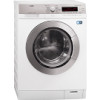AEG L87695WD Product Manual - Page 29
ECOLOGICAL HINTS, DRYING HINTS, Prepare the drying cycle, GARMENT LABELS, DRYING CYCLE DURATION,
 |
View all AEG L87695WD manuals
Add to My Manuals
Save this manual to your list of manuals |
Page 29 highlights
Level 2 3 4 Type medium hard very hard °dH 8-14 15-21 > 21 ECOLOGICAL HINTS To help the environment, use less water and energy, obey these instructions: • Set a programme without the prewash phase to wash laundry with normal soil. • Always start a washing programme with the maximum load of laundry. • If necessary, use a stain remover when you set a programme with a low temperature. • To use the correct quantity of the detergent, check the water hardness of your domestic system DRYING HINTS Prepare the drying cycle • Open the water tap. • Do a check if the connection of the drain hose is correct. Refer to installation chapter for more information. • For the maximum laundry load of the drying programmes, refer to the drying programmes table. Do no not set a drying programme for this laundry: - Very delicate items. - Synthetic curtains. - Woollen and silk items. - Pieces of clothing with metal inserts. - Nylon stockings. - Quilts. - Bed covers. - Duvets. - Anoraks. - Sleeping bags - Fabrics with residue of hair sprays, nail solvents or similar. - Garments with foam-rubber or materi- als similar to foam-rubber. ENGLISH 29 Water hardness °T.H. mmol/l 16-25 1.6-2.5 26-37 2.6-3.7 > 37 >3.7 Clarke 10-16 17-25 >25 GARMENT LABELS When you dry ther laundry, obey the indications on the labels of the manufacturers: • = The item can be tumble dried • = The drying cycle is at high temperature • = The drying cycle is at reduced temperature • = The item can not be tumble dried. DRYING CYCLE DURATION The drying time can change depending on: • speed of the last spin • dryness level • type of laundry • weight of the load size GENERAL TIPS Refer to the «Drying programmes» table to find the average drying times. The experience will help you to dry the laundry in a more correct way. Take note of the duration drying time of the cycles done before. To avoid the static charge at the end of the drying cycle: • Use fabric conditioner in the washing cycle. • Use special fabric conditioner for tumble dryers. When the drying programme is completed remove the laundry in a short time. ADDITIONAL DRYING If, at the end of the drying programme, the laundry is still damp, set a short drying cycle again. WARNING! To avoid creases of fabrics or shrinks of the clothing do not over dry the laundry.















